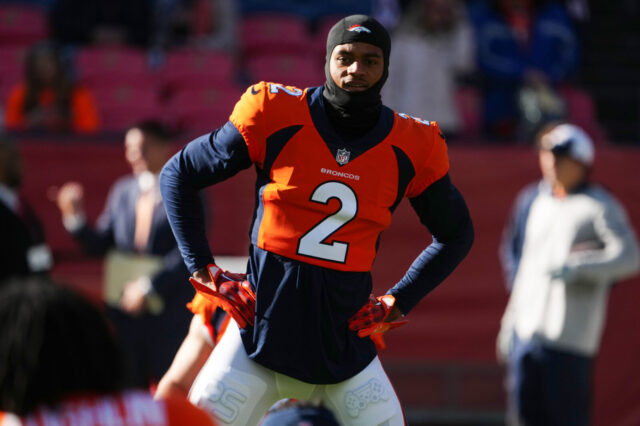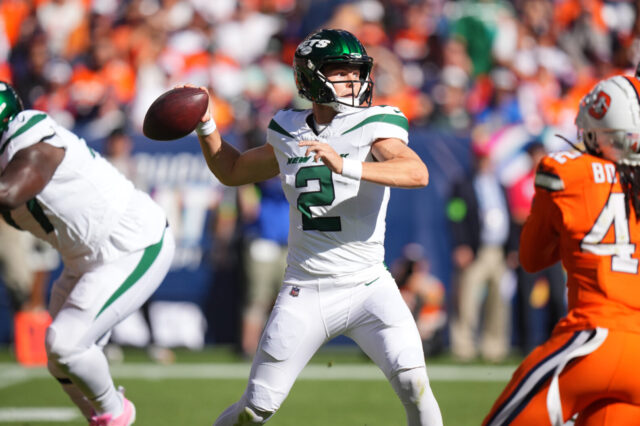The NFL draft is an opportunity for teams to fill immediate holes and pick up players that they can groom to be impact contributors down the line.
The general rule of thumb is to draft an immediate starter at an immediate need with the first-round pick, and pick up another starter between the second and third round picks. The other player of those two rounds should be an impact player, whether that is a starter or a rotation player. The picks in rounds four through seven, the day three picks, are the developmental picks that aren’t expected to have much of an impact in their rookie year.
While most teams generally follow this rule, John Elway, the Denver Broncos Executive Vice President of Football Operations and General Manager, approaches the draft in a different way — and has proved that he is successful in doing so.
After this past weekend’s draft, Elway has been apart of six Broncos drafts, going back to 2011. In five of those drafts, Elway chose to forgo drafting immediate needs, instead drafting players that need to develop in every round of the draft.
Although there is no denying that Elway has had the luxury of doing this because he has had excellent rosters with very few holes, it is also a very bold strategy that is not practiced by many teams.
A great example of the classic approach to the draft, picking up two starters in the first three rounds, is Elway’s first draft with the Broncos in 2011. In this draft, Elway’s first three picks, Von Miller, Orlando Franklin and Rahim Moore each had a significant impact their rookie year.
Miller and Franklin both started every game they appeared in — 15 for Miller and 16 for Franklin, and Moore started in seven of his fifteen appearances. This is the ideal strategy that most teams try to execute in the first three rounds of the draft. The Broncos also had an additional third round pick, Nate Irving, who didn’t start any of the 16 games he appeared in.
However, after the 2011 draft, Elway has used his own strategy, not drafting immediate starters. Since the 2012 draft, only one player Elway has drafted in the first three rounds has started more than four games his rookie year. That player happened to be Elway’s first pick in the 2012 draft, second-round pick Derek Wolfe, who started all 16 games.
In fact, outside of Wolfe, since 2012 only one other player has been drafted with the potential of being the full-time starter his rookie year, 2015 second round pick Ty Sambrailo out of Colorado State. Sambrailo started the first three games of last season, but was sidelined the rest of the year after tearing the labrum in his shoulder.
In the time period from the 2012 draft through the 2015 draft, there were 12 Broncos draft picks in the first three rounds. If Elway were to have drafted with the typical rule, at least eight of those twelve players would have been starters their rookie year; instead, the Broncos produced one — two if you count Sambrailo.
Now, this could be due to poor drafting, as opposed to a fundamental change in drafting style, but with talent and production such as Shane Ray, Bradley Roby, Sylvester Williams, Ronnie Hillman and Brock Osweiler, this notion can quickly be put to bed.
After a quick look at the 2016 draft, it seems as if Elway took the exact same approach. With a pick in each of the first three rounds, Elway chose a player that is not expected to start this year, barring injury or an unforeseen fall from one of the established starters.
Paxton Lynch, the Broncos first-round pick out of Memphis, will compete with Mark Sanchez at quarterback, but is not expected to be the starter this year, as he is viewed as a major project.
Adam Gotsis, the Broncos second-round pick, is also viewed as a player that has a lot of potential, but a lot of room for growth before becoming a starter, too. Gotsis, a defensive lineman from Georgia Tech, will most likely see action as a rotational player, but has two established starters in front of him, Derek Wolfe and newly acquired Jared Crick, which would make it very difficult for him to become a starter this year.
The Broncos third-round pick, safety Justin Simmons out of Boston College, will have plenty of playing time opportunity on special teams and as a backup in the secondary. But being behind established, quality veterans like T.J. Ward and Darien Stewart, he will most likely be in a reserve role this year.
However, the fact that the Broncos most likely didn’t draft an immediate starter this year should come as no surprise after looking at recent history.
And don’t expect this drafting style to change in the near future, as it has proven to work out very well for Elway and the Broncos.
For a breakdown, here’s how Elway’s last six drafts have worked out:
(IMMEDIATE STARTER (YES/NO) — PLAYER NAME; GAMES STARTED ROOKIE SEASON (VETERANS AT POSITION))
2011
YES — Von Miller; 15/15
YES — Orlando Franklin; 16/16
YES — Rahim Moore; 7/15
NO — Nate Irving; 0/16 (Joe Mays)
2012
YES — Derek Wolfe; 16/16
NO — Brock Osweiler; 0/5 (Peyton Manning)
NO — Ronnie Hillman; 0/14 (Willis McGahee)
2013
NO — Sylvester Williams; 4/13 (Terrance Knighton)
NO — Montee Ball; 0/16 (Ronnie Hillman, Knowshon Moreno)
NO — Kayvon Webster; 2/14 (Champ Bailey, Dominique Rodgers-Cromartie)
2014
NO — Bradley Roby; 2/16 (Aqib Talib, Chirs Harris)
NO — Cody Latmier; 0/8 (Demaryius Thomas, Emmanuel Sanders, Wes Welker)
NO — Michael Schofield; 0/0 (Ryan Clady, Chris Clark)
2015
NO — Shane Ray; 0/14 (Von Miller, DeMarcus Ware)
YES — Ty Sambrailo; 3/3
NO — Jeff Heuerman; 0/0 (Owen Daniels, Virgil Green)
2016
NO — Paxton Lynch (Mark Sanchez)
NO — Adam Gotsis (Jared Crick, Derek Wolfe)
NO — Justin Simmons (T.J. Ward, Darien Stewart)



